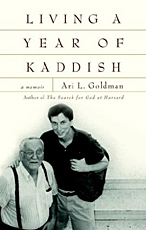Ari L Goldman is an associate professor at Columbia University's Graduate School of Journalism and a former reporter for the New York Times. He lectures throughout the United States on both religion and journalism. He is the author of The Search for God at Harvard and Being Jewish: The Spiritual and Cultural Practice of Judaism Today.
Goldman's father, who lived in Israel, died on the day after the author's fiftieth birthday. Unable to attend the funeral, he decided to say the mourner's kaddish (an Aramaic poem which praises God) daily for the required eleven months. The requirement is to recite this in the presence of a minyan of ten worshippers. While most people think of mourning as a very private affair, the Jewish tradition sees it as a communal one. It's only natural, then, that this memoir includes portraits of some of the people he met at synagogue, including a ninety-year old survivor of the Holocaust, a statistician in the psychiatry department at Mount Sinai Hospital, the classical music writer for the New York Times, and a lapsed Orthodox Jew.
His father's death compels Goldman to do some soul-searching. He recalls the pain he felt following his parents' divorce when he was only six years old. Then there is the anguish he experienced when his father disapproved of his journalism career. Goldman laments the gap that separated them for years but is able to come to a truce with his father by rejoicing in the gifts he passed on to him — teaching him to pray, to cherish Israel, and to be committed to Orthodox Judaism: "From him I learned the rhythm and cadence of prayer and the rapture of it all. He'd gather the fringes of his tallit and put his hands over his eyes as he said the sh'ma, the declaration of God's absolute oneness. He'd stand with his feet together for the amidah, the silent meditation. He taught me how to achieve that perfect balance necessary for proper davening: how to say every word clearly ('not mumbling'), but not loud enough to distract other worshippers nearby."
By the end of this year of mourning for his father, Goldman knows in his heart that kaddish is more for the living than for the dead. He hopes that his children will say kaddish for him, and for themselves as well.
